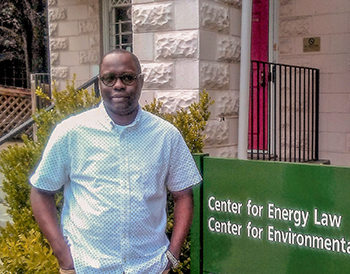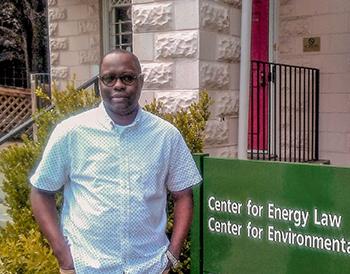From Natural Gas to Renewable Energy Sources
Tade Oyewunmi is in New Orleans to study what consequences the compulsory greening of the energy market will have legally and in terms of maintenance support.


The sun shines when it shines, and the wind blows when it blows. Natural gas, on the other hand, can be turned into electricity at any time: all you have to do is to switch on the gas turbines.
As the world strives for eco-friendliness, one aim is to increasingly replace natural gas with renewable energy. This is an admirable intention, but what does it actually mean technically and judicially?
– The increase in renewables is diversifying the system, which means that fewer customers can completely trust the electrical network, explains Tade Oyewunmi, a legal researcher at the University of Eastern Finland.
– Expensive batteries and other energy storage systems, as well as increasingly accurate measurement devices are required in order for a financially viable balance to be found between supply and demand.
Oyewunmi is now on his second year as a visiting researcher at Tulane University in New Orleans, USA. His project looks at the benefits and costs of increasing the proportion of renewables in energy production using public funding, at the expense of natural gas.
New Orleans is an excellent location for this research. The state of Louisiana is the United States’ fifth-largest natural gas producer, and the shore of the Gulf of Mexico is home to important terminals that supply liquefied natural gas (LNG) to other areas, particularly Europe and Asia.
– USA is the world’s leading natural gas producer. Since 2017 it has been a net exporter of gas thanks to the shale gas business and an increase in demand.
There is high demand for gas because it is the least polluting fossil fuel, and also simply because total energy demand is growing around the world. At the same time there is high political pressure to switch to renewables.
Oyewunmi intends to create a kind of highly complex “road map” of the legal aspects that operators in the sector should keep in mind amid these changes.
– I don’t mean to question the replacement of gas with renewables in itself, but to figure out how it can be done. The various operators in the changing energy market can only make rational decisions if they have a clear understanding of the pros and cons.
Oyewunmi was born in Nigeria and obtained a Bachelor of Laws degree there. After completing a Master’s degree in Scotland, he defended his doctoral thesis at the University of Eastern Finland in 2017. His entire career thus far has focused on energy law, and he would be happy to stick to the subject for the rest of his life.
He is accompanied in New Orleans by his wife and two children. The grant he received also covers some of the costs of childcare, schooling and family insurance.
Tade Oyewunmi, LLD, received a 70,000 euro grant from the Finnish Cultural Foundation’s post doc pool for his post-doctoral research on the role of law and institutions in the changing energy market, which he is carrying out in the United States. Applications for the post doc pool are accepted twice a year, in autumn and spring.
Text: Antti Kivimäki
Pic: Tade Oyewunmi and Tulane University



